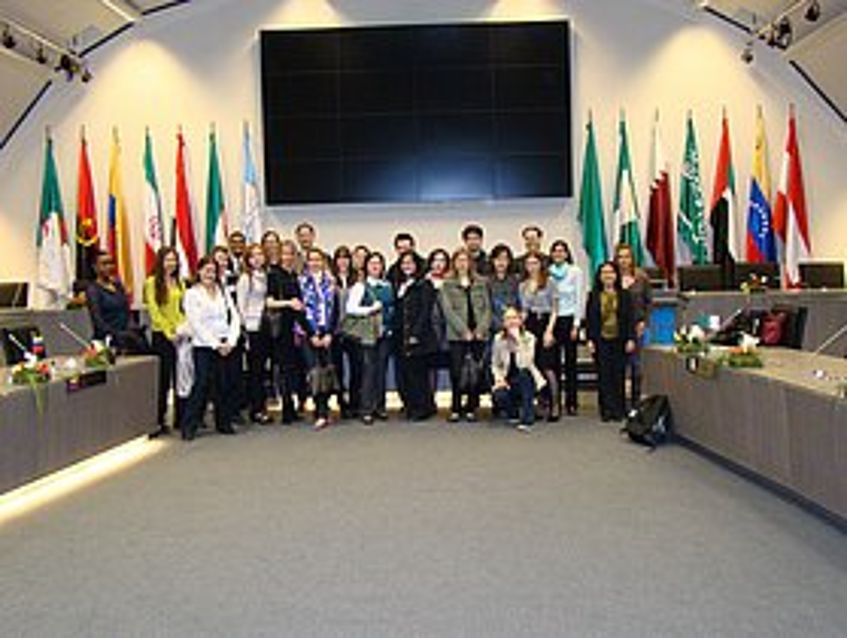International Organizations in Vienna
In March 2010, the 2009/10 LL.M class of the University of Vienna undertook a two day study trip to several international organizations located in Vienna. The class was joined by 10 LL.M. students from the Centre de Droit Comparé, Européen et International (CDCEI) of the University of Lausanne. This study trip which had been organized by the Faculty of Law of the University of Vienna, enabled students to gain a closer understanding of how international organizations work in general, what their everyday duties are, and made them familiar with the specific challenge each organization has to face when fulfilling its mandate.
On the first day, students visited the Organization of Petroleum Exporting Countries (OPEC) and the OSCE. As OPEC had moved into a newly constructed building situated right next to the law school the winter before, the LL.M. students turned out to be the first study group to be guided through the new premises. The tour was followed by a presentation by the PR and Information Department on the activities of OPEC. It provided an insight into the history and mission of the organizations as well as into its goals and policies.
The presentation by two members of the Legal Office about their work was even more interesting for students. Ms. Beatriz Patino-Skotton and Mr. Ali Nasir, both Legal Advisors, provided valuable insights into internal and international legal issues the department deals with. The current focus of the Legal Office was also presented: it covers the correct assessment of supply and demand of crude oil available on the world market, legislative proposals in the field of oil and gas transactions and OPEC' s cooperation with the main oil consuming countries - the US, the EU and China. A Q&A session with the students concluded the visit. It lead to a vivid discussion and showed the students’ great interest in the work and mandate of OPEC.
After a lunch break and a visit through the city centre of Vienna, students were warmly welcomed by the OSCE. This organization is located in the beautiful “Hofburg” premises, the former residence of the Hapsburgs, the ruling house of the Austro-Hungarian monarchy in Vienna, which made the visit even more pleasant.
Dr. Sabine Bauer, Senior Legal Advisor of the Office of the OSCE Secretary- General, presented an overview of the origins of the organization and explained its three comprehensive approaches to security. The world's largest regional security organization lacks legal personality in formal juridical terms due to divergent state interests and does not possess a statutory document. Therefore, the issue of the legal personality and immunities of the organization was a very interesting point of discussion. Afterwards, the main tasks of the OSCE Conflict Prevention Centre (CPC), established within the Secretariat, were presented. The CPC is not only responsible for conflict prevention but also for crisis management and post-conflict rehabilitation. This part of the presentation was particularly interesting as it examined the various field missions the OSCE currently is engaged in different parts of the world.
The second day of the study trip started with the visit to the Vienna International Center, where the United Nations Office at Vienna (UNOV) is located. The highlight of the visit was the presentation by Dr. Behrouz Moradi, Head of the Office of Legal Affairs and Mr. Marco Lau Dan, Legal Advisors to the Office of Legal Affairs of the United Nations Industrial Development Organization (UNIDO). Their presentation covered the historical origin of the UNIDO and its current activity, with the emphasis on legal issues and present challenges: the constituent documents, the legal status of UNIDO' s projects in host countries and the accountability of the organization and its staff members. The latter issue was of particular interest both to participants and speakers since the problem of accountability of international organizations towards their staff and third parties is currently on the front line of legal debates of academics and practitioners. The participants appreciated the discussion a lot, which concluded with a practical exercise: Mr. Moradi and Mr. Lau Dan introduced a case study, based on a real case, in which the host state’s authorities accused a staff member of the UNIDO of having committed a crime. Students were invited to express their views on how this case could be legally solved. The feedback given by the UNIDO Legal Officers were very beneficial to the students' understanding of the issue of accountability of international organizations.
The final visit was undertaken to the Embassy of the Republic of Kosovo in Austria. Ambassador Dr. Sabri Kiqmari presented a lively overview of Kosovo's diplomatic activity and specific challenges arising from its unique and still debated legal status. It was very interesting for the students to gain some insight as to how diplomatic relations between countries are established, which legal issues have to be addressed in the course of this process, how far Kosovo’s recognition by other countries has advanced up to day, and, most importantly, what Kosovo’s further strategy in the field of economic and political development as an independent state looks like.
Yulia Gabidulina and Elisabeth Dobner (LL.M class of 2009/10)


